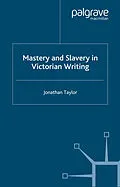Taking Hegel's famous " Master-Slave Dialectic " as its starting point, this wide-ranging book examines portrayals of masters, slaves and servants in works by Carlyle, Dickens, Eliot, Collins and others. The questions raised about modern mastery and slavery are pursued in relation to intriguing nineteenth-century figures as the American slave-holder, the musician, the demagogue and the Jew.
Autorentext
JONATHAN TAYLOR is Lecturer in English at Loughborough University. He also composes music, and has written a radio play about Joseph Emidy, the Cornish composer.
Zusammenfassung
Taking Hegel's famous 'Master-Slave Dialectic' as its point of departure, this wide-ranging book examines portrayals of masters, slaves and servants in works by Thomas Carlyle, Charles Dickens, Wilkie Collins, George Eliot, Richard Wagner and others.Whilst Hegel's writing is marked by the contemporary heroism and 'world mastery' of Napoleon, many of these later writers felt acutely that they were living in a post-Napoleonic world of the 'Sham-Hero'. The questions they raise about mastery, slavery and servitude are pursued in relation to intriguing nineteenth-century figures as the American slave-holder, the musician, the butler, the scientist, the demagogue and 'the Jew'.
Inhalt
Introduction Capitalists, Castrators and Criminals: Violent Masters and Slaves in Wilkie Collins's The Women in White 'Servants' Logic and Analytical Chemistry; Intellectual Masters and Servants in George Eliot and Charles Dickens Slaveholders and Democrats: Combined Masters and Slaves in Thomas Carlyle, Charles Dickens's American Notes and Frederick Douglass's Narrative Heroes, Hero-Worshippers and Jews: Music Masters, Slaves and Servants in Thomas Carlyle, Richard Wagner, George Eliot and George Du Maurier Stump Orators, Phantasm Captains and Mutual Recognition: Popular Masters and Masterlessness in Dickens's Hard Times and Thomas Carlyle's Stump-Orator Afterword, After Slavery, After Shooting Niagara Bibliography Endnotes Index
